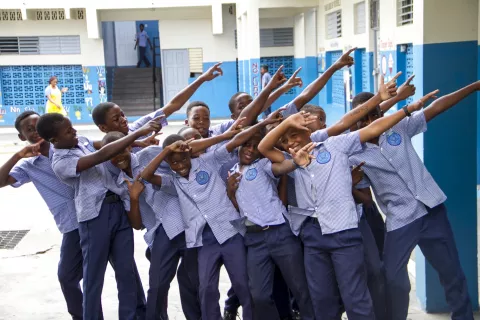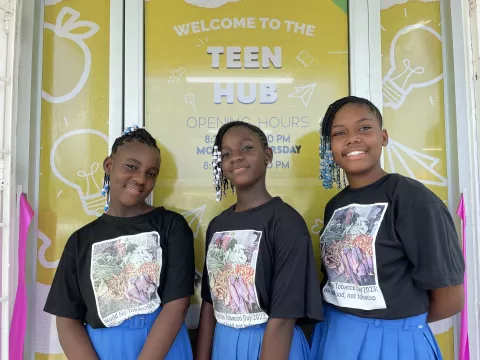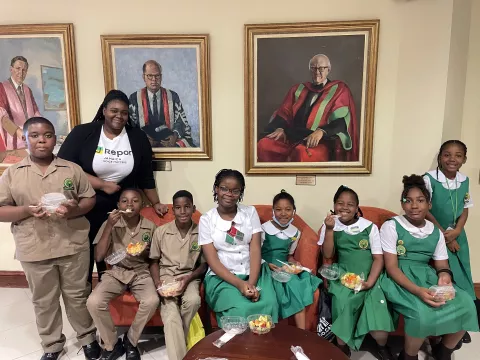As students enter their classroom at Hague Primary and Infant School in Trelawny, they take their seats and begin a deep breathing exercise.
“My children takes a lot of tests and quizzes, and this can be frustrating,” says Rushel Smith-Haslam, Enrichment Coordinator at the school. Smith-Haslam. “They used to come to my class frustrated, because the tests required a lot of reading. But now they will come into the room and they are calm. Their hands are in their laps, they are breathing slowly – and they say, ‘Miss, this really helps me.’”
Smith-Haslam was one of the 440 teachers who participated in the Jamaica Teaching Council’s (JTC) Return to Happiness (RTH) online training in July 2021. The programme, a partnership between UNICEF Jamaica, the Jamaica Teaching Council (JTC), and the Department of Social Work at the University of the West Indies (UWI), focuses on student’s wellbeing and self-expression in navigating the aftermath of the pandemic. Importantly, it also provided support to teachers in terms of their own well-being.
‘Miss, this really helps me.’
Initially developed by UNICEF to support teachers in addressing the psychosocial needs of their students following a natural disaster, the programme has been reframed to focus on building the socio-emotional resilience of students as they adjust to full-time, in-person instruction following almost two years of closure.
“The COVID-19 pandemic was a time of uncertainty and sudden change, with disrupted routines, public health fears, anxiety and broken socialization patterns,” says Allison Solomon, Senior Director of Teacher Development at the JTC. “The Return to Happiness programme provides information and guidance for teachers, guidance counselors, and principals on how to restore happiness in the hearts of children, as well as develop their socio-emotional skills so they can be resilient, whether they are facing a crisis or just going about their day-to-day lives.”
Smith-Haslam provides small-group instruction to students who are seven to 10 years old and who struggle with reading. When her school reopened, Smith-Haslam immediately noticed the social and emotional impact of the pandemic on her students.
Helping recover from lockdowns
“It has been a challenge to get students back into the routine,” she says. “They have returned to school not being so confident, not knowing how to express themselves correctly. They were home for months, and now, suddenly, they are back in a space where they have to share and interact positively.”
Smith-Haslam’s observations mirror UNICEF’s global and regional findings about the psychosocial impacts of the pandemic on children, including worsened mental health and increased anxiety and fear. The Return to Happiness programme aims to address these needs by training teachers to incorporate storytelling, play, and art-based activities to promote students’ self-expression.
While Smith-Haslam appreciates the importance of the initiative, she initially wondered how she would implement these strategies while working urgently to address the pervasive academic learning loss that the pandemic has generated. But she was relieved to find that, rather than operating as a separate curriculum, the Return to Happiness strategies can be embedded into daily instruction.

Infuse into existing lessons
“The training facilitator stressed that these strategies are meant to be infused into existing lessons,” Smith-Haslam explains. “They are not a separate curriculum.”
The programme’s impact has been particularly significant for two of her students.
“Recently, we were reading a story that was focused on the sound that the letter H makes,” says Smith-Haslam. “Two of my students used to have frequent friction with one another, and I knew they were having an unkind exchange that day. I told these two that I wanted them to write a letter to one another using words with the H-sound. I asked everybody to do it, but I directed the two of them to write to each other. Of course, they protested – but then they wrote letters expressing how they felt, and I was able to figure out what the problem was between them.”
Make students feel included, meaningfully
It is this approach that is the emphasis of the Return to Happiness programme. “It is always important to include the student’s voice in learning outcomes as it lifts the entire educational experience,” explains Rebecca Tortello, UNICEF Education Specialist. “As we work to build back better, overall emotional wellness is rightfully being prioritised across our system and Return to Happiness, which is rooted in a student-centred approach, is more than timely. We are happy to see it taking root and finding its space in the teacher support landscape, benefitting students and teachers equally.”
And if you are curious about the two students who exchanged letters, you would be happy to know, “They are friends now,” Smith-Haslam said. “These strategies focused on self-expression work. They really work.”
What is UNICEF doing?
UNICEF Jamaica is working with education partners to not only bring attention to the need for improved mental health support and care for children and adolescents, but to provide usable and useful strategies to do so. These include support for the development of courses like Return to Happiness, the roll out of the student-centred, emotionally supportive positive behaviour framework known as SWPBIS, the National College for Educational Leadership’s (NCEL)’s Child Friendly Schools course (CFS) and its Leadership for Safer Schools (LSS) Programme.
Another of our critical initiatives is the U-Matter Chatline. It is provided free by UNICEF’s U-Report messaging service for youth, connecting users aged 16-24 years to chat anonymously and confidentially with trained counsellors. To access help, young people are encouraged to message the word SUPPORT to 876-838-4897 on WhatsApp or with free SMS for Flow customers; or @ureportjamaica on Instagram and Facebook Messenger. Together with the Ministry of Health and Wellness, U-Matter chatline has provided more than 2,000 sessions with trained counsellors.





